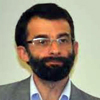 Professor Arkadi Zelster teaches the “Holocaust in the former USSR”- here’s a link to the syllabus.
Professor Arkadi Zelster teaches the “Holocaust in the former USSR”- here’s a link to the syllabus.
In a recent article in the academic journal “Eastern European Jewish Affairs”, Professor Arkadi Zeltser of the University of Haifa examines suspicion of Jews by non-Jewish Soviets during the latter phase of the Second World War, in the years 1941-45. In this time period, many non-Jews asked the question “Where are the Jews at the Front?”, with particular unintended consequences for Soviet Jewish identity.
As Professor Zeltser summarizes, there were a variety of reasons for a rise in anti-semitic expression from 1941. The rapid German advance was a shock to the Russians, who had been promised a swift victory. A desire to encourage dedication to the war effort led to a newly positive promotion of love for the ‘homeland’. Lack of reliable information brought instability which was fanned into panic by the scarcity of food and influx of Jews evacuated from the areas of the front lines. In a natural human response, ordinary Russians looked for someone to blame, and found traditional scapegoats in the Jews.
Alongside this, a breakdown in the Stalinist control of propaganda brought a rise in Slavic glorification. Russian peoples were seen as warlike and brave, while other ethnicities were presented as inferior and ‘merchantlike’. In this climate, old Russian ethnic anti-semitic tendencies resurfaced, bringing with them traditional views of the Jews as cowardly, unreliable and unpatriotic. As Professor Zeltser notes, these tropes were old, but to Soviet Jews they seemed like a new and inexplicable wave of persecution.
The most commonly repeated accusation against the Jews was that they were cowards, evading having to fight while the brave Russians risked their lives. Jews were portrayed as being unpatriotic and incapable of feeling true love for the ‘homeland’. The question that Professor Zeltser refers to in his title was asked again and again both on the front and in the rear, “Where are the Jews on the front line?”
Professor Zeltser writes that Jewish soldiers fighting on the front lines did not report many incidences of anti-semitism. He gives various reasons why anti-semitism may not have impinged strongly upon Jewish soldiers, but emphasizes that Jewish soldiers were nonetheless hurt by accusations of cowardice and lack of patriotism. To a greater extent, Jewish soldiers were pained by reports from non-combatant relatives of experiencing anti-semitic speech and acts, as they viewed themselves as protecting their family and friends by serving in the army.
As Professor Zeltser outlines, Jewish Soviets in the years 1941-45 largely saw themselves as fellow Soviets, on an equal footing with all the rest of their brother communists. They believed that in the USSR, all people were equal regardless of ethnicity or religious origin, and were particularly upset by the resurgence of anti-semitism which excluded them from the Soviet common weal. Soviet authorities mostly did little to crack down on anti-semitism during this time, largely out of simple uncertainty as to how to proceed, but their inaction was taken as a further slap in the face by Jewish Soviets.
Professor Zeltser notes that the instability of war, lack of reliable information and fear of defeat combined with the general rise of Russification and Slavic glorification to revive old anti-semitic tropes of Jewish cowardice and lack of patriotism. In response, Jews felt that it was a Russian mindset which despised them while the Soviet worldview still represented equality of all peoples. Perhaps ironically, as Professor Zeltser concludes, the return of Russian anti-semitism in Soviet clothing stirred the hitherto neglected sense of Jewish feeling among Jews who were proud Soviets. It may well have been a factor in reinforcing Soviet Jewish identity within both Jewish civilians and Jewish officers and soldiers in the Red Army.
Interested in applying for our MA in Holocaust Studies Program? You can find the application and more information at our website